1984 Summer Olympics boycott
| Part of a series on |
|
The boycott of the 1984 Summer Olympics in Los Angeles was a follow-up to the U.S.-led boycott of the 1980 Summer Olympics in Moscow. The boycott involved 14 Eastern Bloc countries and allies, led by the Soviet Union, who initiated the boycott on May 8, 1984. The boycott affected a large number of Olympic events that were normally dominated by the absent countries. Boycotting countries organized another major event, called the Friendship Games, in July–August 1984.
Announcement of boycott
The USSR announced its intentions to boycott the 1984 Summer Olympics on May 8, 1984,[1] citing security concerns and stating that "chauvinistic sentiments and an anti-Soviet hysteria [were] being whipped up in the United States".[1] A US official said the country had ignored suggestive comments by the Soviets in the weeks building up to the announcement and that, in spite of all the indications, the United States was "absolutely dumbfounded" when the official announcement arrived.[2]
After the announcement, six more nations joined the boycott, including Bulgaria, East Germany (on May 10), Mongolia and Vietnam (both May 11),[3] and Laos and Czechoslovakia (both May 13). China formally confirmed that it would be present at the games in Los Angeles, while the Laotians and Czechs announced their decision to boycott the event.[4]
Later, Afghanistan also decided to boycott the event, becoming the eighth country to boycott the 1984 Summer Olympics.[5] Even later, Hungary (May 16) and Poland (May 17) became the ninth and tenth countries to join the boycott. Hungary claimed the lives of its athletes would be put in danger if they were to spend time in Los Angeles. On the other hand, Poland said that the United States was engaging in a "campaign aimed at disturbing the Games". [6][7]
Cuba was the eleventh country to announce its participation in the boycott, making front page news in the United States because it was a "serious blow to boxing and baseball" (May 24).[8] South Yemen was the twelfth country to remove itself from the event (May 27); the Los Angeles Times stated that this was due to their "Marxist" connections.[9] North Korea was the thirteenth nation to boycott the 1984 Olympics.[10] Ethiopia became the first African state to participate in the boycott, followed by Angola's.[11]
Iran decided to boycott the 1984 Summer Olympics because of "United States interference in the Middle East, its support for the regime occupying Jerusalem, and the crimes being committed by the U.S.A. in Latin America, especially in El Salvador".[12] Iran and Albania were the only countries not to attend both the 1980 Moscow and the 1984 Los Angeles Olympics. Libya also boycotted but for separate reasons.
Revenge hypothesis
Jimmy Carter declared that the United States would boycott the 1980 Olympic Games in Moscow, with 59 other countries joining the boycott.[13] This was the largest Olympic games boycott ever. In 1984, three months before the start of the 1984 summer games in Los Angeles, the Soviet Union declared it would "not participate" in the 1984 games, due to the commercialization of the games and lack of security for the athletes. 13 other countries joined in the boycott. Howard A. Tyner of the Chicago Tribune said "Deep down, it was undoubtedly the hurt and embarrassment of 1980 that lies behind the stunning Soviet decision Tuesday to pass up this year's Summer Olympic Games in Los Angeles."[14]
Most of the world's media interpreted the Soviet boycott as retaliation for the US boycott of the 1980 Moscow Games,[15] which had been in response to the 1979 Soviet invasion of Afghanistan,[14] whereas the state-controlled Soviet media repeated the government line that the boycott was a safety measure to protect their own athletes. However, no threat to eastern bloc athletes was ever discovered, and the athletes from the eastern bloc country that did attend the 1984 games in Los Angeles—Romania—encountered no problems, and in fact were widely cheered above all other visiting nations at the Opening Ceremonies when they marched into the Coliseum. Romania ended up finishing second in overall medal count at the games.
Among those subscribing to the 'revenge hypothesis' was Peter Ueberroth, the chief organizer of the 1984 L.A. Games, who expressed his views in a press conference after the boycott was announced, on the same day that the Olympic torch relay in the United States began in New York City. U.S. President Ronald Reagan later stated his belief that the Soviets feared some of their athletes might defect. As well, President Reagan and his administration agreed to meet all of the demands of the Soviet Union in turn for the Soviet Bloc's attendance at the 1984 Olympics, marking a stark contrast in Reagan's "hawkish" views on Cold War foreign policy.[16] As more countries withdrew, the IOC announced on the deadline week that it would consider extending the deadline for entry into the Olympics.[17] The three top medal winners from the 1980 Games (which was the subject of a boycott by 60 nations) in Moscow were among the boycotters, and media analysis noted this would weaken the field of competitors in a number of sports.[18]
Boycotting countries
Listed in the chronological order of their withdrawal, not by alphabetical or any geographical order. 16 or 18 (from different sources) in all.
-
 Soviet Union
Soviet Union -
.svg.png) Bulgaria
Bulgaria -
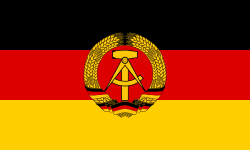 East Germany
East Germany -
.svg.png) Mongolia
Mongolia -
 Vietnam
Vietnam -
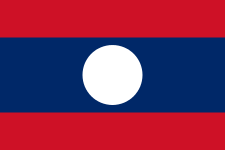 Laos
Laos -
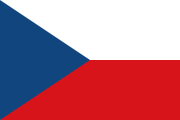 Czechoslovakia
Czechoslovakia -
.svg.png) Afghanistan
Afghanistan -
 Hungary
Hungary -
 Poland
Poland -
 Cuba
Cuba -
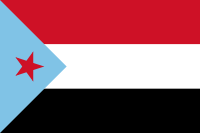 South Yemen
South Yemen -
 North Korea
North Korea -
.svg.png) Ethiopia
Ethiopia -
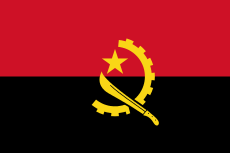 Angola
Angola - Three others did not compete:
Non-boycotting Socialist countries
Seven socialist countries did not join the Soviet-led boycott and instead sent teams to the 1984 Summer Olympics. Most of them were from socialist African Countries.
-
.svg.png) Romania was the only member of the Warsaw Pact that did not boycott the Games. Its leader, Nicolae Ceaușescu, was famous for openly opposing various policies of the Soviet Union.
Romania was the only member of the Warsaw Pact that did not boycott the Games. Its leader, Nicolae Ceaușescu, was famous for openly opposing various policies of the Soviet Union. -
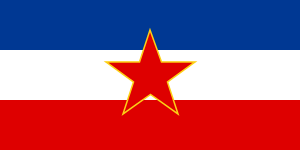 Yugoslavia was a non-aligned country that acted independently of the Soviet Union. Yugoslavia shared friendly relations with both the Soviet Union and the United States, therefore it did not participate in either of the boycotts. It had just hosted the 1984 Winter Olympics.
Yugoslavia was a non-aligned country that acted independently of the Soviet Union. Yugoslavia shared friendly relations with both the Soviet Union and the United States, therefore it did not participate in either of the boycotts. It had just hosted the 1984 Winter Olympics. -
 China was somewhat hostile towards the Soviet Union at the time, but had been experiencing a cordial relationship with the United States. In 1980, China had sent a team to the Winter Olympics in the United States, while boycotting the Summer Olympics in the Soviet Union. The 1984 games became the first summer games since 1932 (coincidentally also held in Los Angeles) at which China participated.
China was somewhat hostile towards the Soviet Union at the time, but had been experiencing a cordial relationship with the United States. In 1980, China had sent a team to the Winter Olympics in the United States, while boycotting the Summer Olympics in the Soviet Union. The 1984 games became the first summer games since 1932 (coincidentally also held in Los Angeles) at which China participated. -
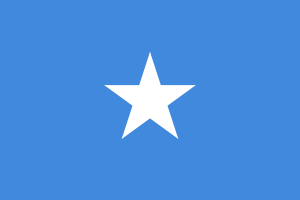 Somalia had broken relations with the Soviet Union after the latter's support for Ethiopia in the Ethio-Somali War.
Somalia had broken relations with the Soviet Union after the latter's support for Ethiopia in the Ethio-Somali War. -
 People's Republic of the Congo
People's Republic of the Congo -
.svg.png) People's Republic of Benin
People's Republic of Benin -
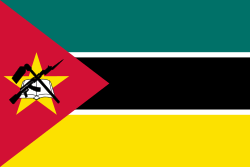 People's Republic of Mozambique
People's Republic of Mozambique
In popular culture
In the Season 4 episode, "Lisa's First Word", of the U.S. television show The Simpsons, Krusty Burger is featured in a promotion where the characters get free food if they receive a slip that features an event that was "won" by the United States. The promotion was rigged, as was said in the episode, where every game card was to be in an event that "Communists never lose". However, almost immediately after that is said, word of the boycott is spread and the rigging backfires. Krusty Burger loses so much money on the promotion that Krusty publicly states that he will "personally spit in every 50th burger".
The Krusty Burger promotion paralleled a real-life McDonald's scratch-card promotion from the 1984 Olympics that also lost the corporation money. The promotion was called "If the US Wins, You Win!" and gave away Big Mac hamburger sandwiches for every gold medal, fries for every silver medal, and Coca-Cola beverages for every bronze.[19]
References
- ↑ 1.0 1.1 Burns, John F. (May 9, 1984). "Moscow Will Keep Its Team From Los Angeles Olympics". New York Times.
- ↑ East Germany withdraws from Summer Games. The Evening Independent – May 10, 1984.
- ↑ VIETNAM AND MONGOLIA ALSO WITHDRAW FROM OLYMPICS. Philadelphia Inquirer. May 12, 1984 – A07 NATIONAL.
"Two more Communist countries dropped out of the 1984 Los Angeles Olympics yesterday, but the head of the International Olympic Committee promised to 'fight to the last minute' to bring the Soviet Union and its allies to the Games." - ↑ Reich, Kenneth. Czechs and Laotians Join Boycott: China Confirms It Will Take Part in Summer Olympics. The LA Times. May 13, 1984. SD1.
- ↑ Lowitt, Bruce. Afghanistan Joins Boycott. The Victoria Advocate. May 14, 1984.
- ↑ Hungary 9th to Join Boycott of Olympics. The LA Times. May 16, 1984. A1.
- ↑ Barnard, William R. Poland 10th to join Olympic boycott: Romania only Soviet ally still in games. The Deseret News.
- ↑ Maxwell, Evan. Cuba Joins Olympic Boycott: Serious Blow to Boxing and Baseball. The LA Times. May 24, 1984. 1.
- ↑ Marxist South Yemen Becomes 12th Country to Drop Out of L.A. Games. The LA Times. May 27, 1984. A27.
- ↑ N. KOREA JOINS OLYMPIC BOYCOTT. Miami Herald. June 3, 1984. "While North Korea became the 13th nation to join the Soviet Union in boycotting the 1984 Summer Olympics in Los Angeles, Soviet star Sergei Bubka Saturday shattered his week-old world record in the pole vault".
- ↑ Reich, Kenneth. Angola Becomes 15th Nation to Join Olympic Boycott. The LA Times. Jun 27, 1984. B3.
- ↑ Iran Announces Boycott Of the 1984 Olympics. The New York Times. Published: August 2, 1983.
- ↑ http://news.google.com/newspapers?nid=2245&dat=19800805&id=3mkzAAAAIBAJ&sjid=ODIHAAAAIBAJ&pg=3369,3795178
- ↑ 14.0 14.1 Tyner, Howard A. U.S. Olympic boycott of 1980 led to Soviet decision of 1984. Chicago Tribune. May 9, 1984. D13.
- ↑ http://www.lequipe.fr/Tous-sports/Article/1984-les-jeux-penchent-a-l-ouest/18106
- ↑ Congelio, Brad, "Before The World Was Quiet: Ronald Reagan, Cold War Foreign Policy, And The 1984 Los Angeles Olympic Summer Games" (2014, PhD Dissertation)
- ↑ Reich, Kenneth. Olympic Entry Deadline Might Be Extended. The LA Times. May 30, 1984. OC3.
- ↑ East Germany Joins L.A. Olympics Boycott. Sarasota Herald-Tribune – May 11, 1984.
- ↑ "If Tonga wins, you win!".
See also
| ||||||||||||||||||